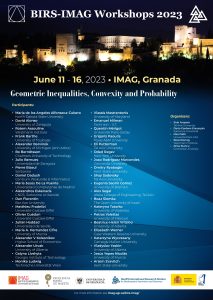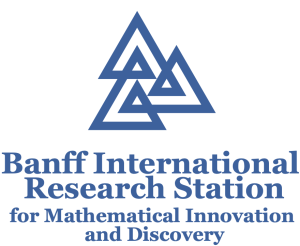Detalles de Evento
June 11-16, 2023
The Institute of Mathematics at the University of Granada will host the "Geometric Inequalities, Convexity and Probability" workshop at the University of Granada (IMAG) in Spain, from June 11 - 16, 2023.
Mathematical developments of the last decades indicate that geometry of high dimensions, when viewed correctly, creates remarkable order and simplicity rather than untamed complexity. Its applications permeated the fields of analysis and probability, reaching far away domains as Theoretical Computer Science and Statistical Physics while, simultaneously, methods and techniques came from a variety of directions ranging from classical analysis and probability to dynamical systems and topological methods. Recent striking results such as the near resolution of the Kannan, Lov\'asz and Simonovits (KLS) conjecture and the Bourgain slicing problem, the proof of the Gaussian Correlation Conjecture and advances in concentration of measure, make ripe the timing of this workshop on the effects of convexity and probability on high-dimensional geometric phenomena. By exploiting the scientific momentum, the workshop aims to engage a new generation in exciting collaborations and research directions.
More information can be found on the BIRS website.
Online attendance
The talks of this workshop will be broadcast via Google Meet and they can be followed at https://meet.google.com/cbp-dnqd-yai
Schedule
Further details, including abtracts of the talks, can be found on the BIRS website.
Organizers
- Shiri Artstein (Tel-Aviv University)
- Dario Cordero-Erausquin (Sorbonne Université)
- Max Fathi (Universite Paris-Cité)
- Boaz Klartag (Weizmann Institute)
- Alina Stancu (Concordia University)
Confirmed participants
- María de los Angeles Alfonseca-Cubero (North Dakota State University)
- David Alonso (Universidad de Zaragoza)
- Rotem Assouline (Weizmann Institute)
- Frank Barthe (University of Toulouse)
- Alexander Barvinok (University of Michigan)
- Bo Berndtsson (Chalmers University of Technology)
- Julio Bernues (Universidad de Zaragoza)
- Pierre Bizeul (Sorbonne Université)
- Daniel Dadush (Centrum Wiskunde & Informatica)
- Alexandros Eskenazis (CNRS, Sorbonne Université)
- Dan Florentin (Bar-Ilan University)
- Matthieu Fradelizi (Université Gustave Eiffel)
- Olivier Guedon (Université Gustave Eiffel)
- Julián Haddad (Universidad de Sevilla)
- Maria A. Hernandez Cifre (Universidad de Murcia)
- Alexander V Kolesnikov (Higher School of Economics)
- Alexander Litvak (University of Alberta)
- Galyna Livshyts (Georgia Institute of Technology)
- Monika Ludwig (Technische Universität Wien)
- Vlassis Mastrantonis (University of Maryland)
- Emanuel Milman (Technion - I.I.T.)
- Quentin Mérigot (Université Paris-Saclay)
- Grigoris Paouris (Texas A&M University)
- Eli Putterman (Tel Aviv University)
- Oded Regev (New York University)
- Joao Rodriguez Marcondes (Concordia University)
- Dmitry Ryabogin (Kent State University)
- Shay Sadovsky (Tel Aviv University)
- Eugenia Saorin Gomez (University of Bremen)
- Alex Segal (Afeka college of engineering, Tel Aviv)
- Boaz Slomka (The Open university of Israel)
- Kateryna Tatarko (University of Waterloo)
- Petros Valettas (University of Missouri)
- Beatrice-Helen Vritsiou (University of Alberta)
- Elisabeth Werner (Case Western Reserve University)
- Katarzyna Wyczesany (Carnegie Mellon University)
- Vladyslav Yaskin (University of Alberta)
- Jesús Yepes Nicolás (Universidad de Murcia)
- Artem Zvavitch (Kent State University)
- María Jesús De La Puente (Universidad Complutense de Madrid)




